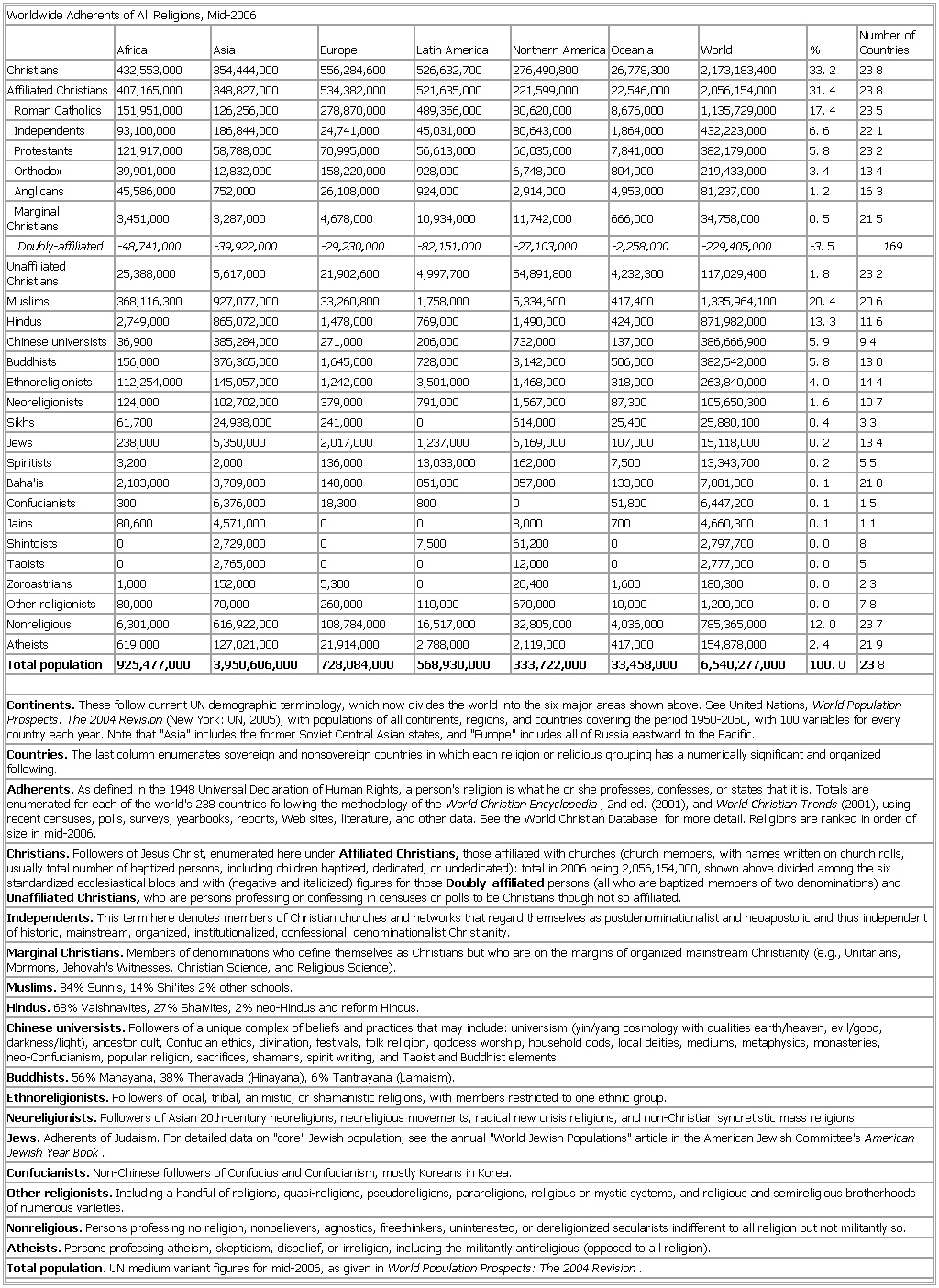- Worldwide Adherents of All Religions, Mid-2006
-
▪ TableWorldwide Adherents of All Religions, Mid-2006Africa Asia Europe Latin America Northern America Oceania World % Number of CountriesChristians 432,553,000 354,444,000 556,284,600 526,632,700 276,490,800 26,778,300 2,173,183,400 33.2 238Affiliated Christians 407,165,000 348,827,000 534,382,000 521,635,000 221,599,000 22,546,000 2,056,154,000 31.4 238Roman Catholics 151,951,000 126,256,000 278,870,000 489,356,000 80,620,000 8,676,000 1,135,729,000 17.4 235Independents 93,100,000 186,844,000 24,741,000 45,031,000 80,643,000 1,864,000 432,223,000 6.6 221Protestants 121,917,000 58,788,000 70,995,000 56,613,000 66,035,000 7,841,000 382,179,000 5.8 232Orthodox 39,901,000 12,832,000 158,220,000 928,000 6,748,000 804,000 219,433,000 3.4 134Anglicans 45,586,000 752,000 26,108,000 924,000 2,914,000 4,953,000 81,237,000 1.2 163Marginal Christians 3,451,000 3,287,000 4,678,000 10,934,000 11,742,000 666,000 34,758,000 0.5 215Doubly-affiliated -48,741,000 -39,922,000 -29,230,000 -82,151,000 -27,103,000 -2,258,000 -229,405,000 -3.5 169169Unaffiliated Christians 25,388,000 5,617,000 21,902,600 4,997,700 54,891,800 4,232,300 117,029,400 1.8 232Muslims 368,116,300 927,077,000 33,260,800 1,758,000 5,334,600 417,400 1,335,964,100 20.4 206Hindus 2,749,000 865,072,000 1,478,000 769,000 1,490,000 424,000 871,982,000 13.3 116Chinese universists 36,900 385,284,000 271,000 206,000 732,000 137,000 386,666,900 5.9 94Buddhists 156,000 376,365,000 1,645,000 728,000 3,142,000 506,000 382,542,000 5.8 130Ethnoreligionists 112,254,000 145,057,000 1,242,000 3,501,000 1,468,000 318,000 263,840,000 4.0 144Neoreligionists 124,000 102,702,000 379,000 791,000 1,567,000 87,300 105,650,300 1.6 107Sikhs 61,700 24,938,000 241,000 0 614,000 25,400 25,880,100 0.4 33Jews 238,000 5,350,000 2,017,000 1,237,000 6,169,000 107,000 15,118,000 0.2 134Spiritists 3,200 2,000 136,000 13,033,000 162,000 7,500 13,343,700 0.2 55Baha'is 2,103,000 3,709,000 148,000 851,000 857,000 133,000 7,801,000 0.1 218Confucianists 300 6,376,000 18,300 800 0 51,800 6,447,200 0.1 15Jains 80,600 4,571,000 0 0 8,000 700 4,660,300 0.1 11Shintoists 0 2,729,000 0 7,500 61,200 0 2,797,700 0.0 8Taoists 0 2,765,000 0 0 12,000 0 2,777,000 0.0 5Zoroastrians 1,000 152,000 5,300 0 20,400 1,600 180,300 0.0 23Other religionists 80,000 70,000 260,000 110,000 670,000 10,000 1,200,000 0.0 78Nonreligious 6,301,000 616,922,000 108,784,000 16,517,000 32,805,000 4,036,000 785,365,000 12.0 237Atheists 619,000 127,021,000 21,914,000 2,788,000 2,119,000 417,000 154,878,000 2.4 219Total population 925,477,000 3,950,606,000 728,084,000 568,930,000 333,722,000 33,458,000 6,540,277,000 100.0 238Continents. These follow current UN demographic terminology, which now divides the world into the six major areas shown above. See United Nations, World Population Prospects: The 2004 Revision (New York: UN, 2005), with populations of all continents, regions, and countries covering the period 1950-2050, with 100 variables for every country each year. Note that "Asia" includes the former Soviet Central Asian states, and "Europe" includes all of Russia eastward to the Pacific.Countries. The last column enumerates sovereign and nonsovereign countries in which each religion or religious grouping has a numerically significant and organized following.Adherents. As defined in the 1948 Universal Declaration of Human Rights, a person's religion is what he or she professes, confesses, or states that it is. Totals are enumerated for each of the world's 238 countries following the methodology of the World Christian Encyclopedia, 2nd ed. (2001), and World Christian Trends (2001), using recent censuses, polls, surveys, yearbooks, reports, Web sites, literature, and other data. See the World Christian Database
for more detail. Religions are ranked in order of size in mid-2006. Christians. Followers of Jesus Christ, enumerated here under Affiliated Christians, those affiliated with churches (church members, with names written on church rolls, usually total number of baptized persons, including children baptized, dedicated, or undedicated): total in 2006 being 2,056,154,000, shown above divided among the six standardized ecclesiastical blocs and with (negative and italicized) figures for those Doubly-affiliated persons (all who are baptized members of two denominations) and Unaffiliated Christians, who are persons professing or confessing in censuses or polls to be Christians though not so affiliated.Independents. This term here denotes members of Christian churches and networks that regard themselves as postdenominationalist and neoapostolic and thus independent of historic, mainstream, organized, institutionalized, confessional, denominationalist Christianity.Marginal Christians. Members of denominations who define themselves as Christians but who are on the margins of organized mainstream Christianity (e.g., Unitarians, Mormons, Jehovah's Witnesses, Christian Science, and Religious Science).Muslims. 84% Sunnis, 14% Shi'ites 2% other schools.Hindus. 68% Vaishnavites, 27% Shaivites, 2% neo-Hindus and reform Hindus.Chinese universists. Followers of a unique complex of beliefs and practices that may include: universism (yin/yang cosmology with dualities earth/heaven, evil/good, darkness/light), ancestor cult, Confucian ethics, divination, festivals, folk religion, goddess worship, household gods, local deities, mediums, metaphysics, monasteries, neo-Confucianism, popular religion, sacrifices, shamans, spirit writing, and Taoist and Buddhist elements.Ethnoreligionists. Followers of local, tribal, animistic, or shamanistic religions, with members restricted to one ethnic group.Neoreligionists. Followers of Asian 20th-century neoreligions, neoreligious movements, radical new crisis religions, and non-Christian syncretistic mass religions.Jews. Adherents of Judaism. For detailed data on "core" Jewish population, see the annual "World Jewish Populations" article in the American Jewish Committee's American Jewish Year Book.Confucianists. Non-Chinese followers of Confucius and Confucianism, mostly Koreans in Korea.Other religionists. Including a handful of religions, quasi-religions, pseudoreligions, parareligions, religious or mystic systems, and religious and semireligious brotherhoods of numerous varieties.Nonreligious. Persons professing no religion, nonbelievers, agnostics, freethinkers, uninterested, or dereligionized secularists indifferent to all religion but not militantly so.Atheists. Persons professing atheism, skepticism, disbelief, or irreligion, including the militantly antireligious (opposed to all religion).Total population. UN medium variant figures for mid-2006, as given in World Population Prospects: The 2004 Revision.See as table:
* * *
Universalium. 2010.
